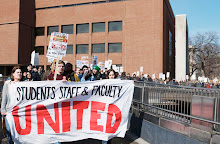The CLA 2015 committee has released its interim report, which can be downloaded here:
http://blog.lib.umn.edu/cla/cla2015/
CLA 2015 is the only "blue ribbon" committee to publicly release its report. We commend Dean Parente for recognizing the importance of public disclosure of these reports and his willingness to engage in public discussions with faculty via town hall meetings. The Dean has an unenviable task. The College will have to make painful cuts, cuts that are all the more damaging given that departments and programs have already made deep cuts. There is not a lot of fat left to cut.
The Daily wrote a sharp editorial about the report:
http://www.mndaily.com/2010/04/28/cla-without-liberal-arts
The editorial noted that CLA could eliminate more than half of its programs in order to better fund fewer "signature" programs "of distinction," and questions whether this can be done without jeopardizing a liberal arts education. "What the CLA 2015 Committee has called “creative reorganization” may sound good in theory, but don’t be fooled by the spin; eliminating over half of the CLA’s programs for any reason is destructive, not creative."
FRPE activist Eva van Dassow attended the town hall meeting on April 27 and prepared the following report:
Parente opened with a preamble describing his charge to the CLA 2015 committee, proceeding from central administration's directive to identify areas where the college should dis/invest; this directive was focused on addressing the current crisis, but the dean and the committee took it as a mandate to do more long-term planning and consider how CLA can prepare itself to deal with changes in the national landscape of higher education: how can we both meet the current financial exigency and strengthen and reenergize education and research in the liberal arts? Chris Uggen and Gary Oehlert each added a few words and then the three began to entertain questions.
Simona Sawhney spoke first, agreeing with the need for inventive thinking but pointing out that the emphasis on striving for distinction and developing only "signature" programs was out of joint with the ideals of liberal education articulated within the CLA 2015 report: the theme is a race to be the "best," but what does it mean to suggest, for example, that our students will have "the best" understanding of democracy, justice, and equality, while elsewhere there will be only mediocre understanding? Uggen's response reiterated commitment to excellence; Parente focused on the college as a locus of intellectual community.
Someone said the proposals outlined in this document seem to make CLA very static -- where is there provision for growth? Oehlert disagreed, saying we do want faculty to think about bold new programs. Uggen pointed to the 14th goal, which asks administration to remove barriers to creating new programs. Thereupon someone asked about the budget model, which inhibits cross-collegiate collaboration, and what may be the prospects for change there. Parente replied that there is widespread recognition that the budget model inhibits collaboration, sets colleges against each other, and needs adjustment; he says a committee has been appointed to work on this problem as well as the issue of cost pools.
Sonja Kuftinec returned to the issues of excellence and distinction, observing that this terminology is embedded in structures of knowledge and power. We cannot pretend there are objective ways to assess excellence and distinction; moreover, many faculty "create knowledge" in transactional rather than enunciative ways, and this is not subject to assessment as "products." Thus the notion of "excellence" tends to be deployed to excise the most radical programs. Further, she would caution against using the language of budgeting and of the market, which yields an "efficiency" model, not a model of intellectual inquiry. So, she asked, what are to be the criteria for determining what's excellent and distinctive?
Oehlert tried to answer but came up empty; when pressed to say "what do *you* think the criteria should be?" he replied that the answers have to differ for different disciplines and CLA is too diverse for a single set of criteria. Uggen remarked that one approach is a "checklist" (time to degree, rankings, etc.) while another, more open-ended, focuses on what is intellectually exciting.
Tom Wolfe described the document (the CLA 2015 interim report) as incoherent, qualifying this as less a criticism than an observation that it contains many diverse voices and goals, and it would be useful to pull the several issues within it apart -- for example, students are described in a somewhat unrealistic way; many of our students are transfer students, not necessarily ready for high-level research of the sort envisioned here. Someone then remarked on the issues of access and diversity, which always seem to be tacked on as a sort of window-dressing.
A grad student raised the issue of how faculty [and students] are continually compelled to compete for resources, which doesn't seem the best way to spend people's time and energy.
I pointed out that on different pages the document states a) that some graduate programs generate a "consistent oversupply of graduates" and b) that CLA can expect to shrink its faculty further in the next few years; these two statements need to be connected to each other: no wonder graduates can't get jobs when we and every other institution keep making the jobs go away! yet the reduction in faculty positions does not legitimately respond to market realities, because there are no fewer students and courses to teach than there were before. Then I asked how seriously anyone meant the proposal on p. 15, "Should undergraduate education be organized around themes and challenges rather than disciplines or methodologies?" which, if implemented, could result in "signature" programs that were utterly vacuous. Oehlert defended the idea, followed by Parente, who explained that he had in mind "interdisciplinary majors"; eventually I got a chance to say that was something we already did, which moreover would be endangered if we are to cut the number of programs we offer in half (as the document says we must), and moreover it is very different from the statement quoted -- you can't have interdisciplinarity without the disciplines. To which Parente replied that of course, the disciplines are the pillars on which everything else is built.
Theo Stavrou stated that we are severely handicapped if we continue to reduce the numbers of graduate students; we need a critical mass of students in our graduate programs to form intellectual community. Moreover, we should not pretend it is the market driving this decline: we create knowledge, we can create markets, too. Parente objected that it's unethical to train graduate students in fields where they cannot get jobs.
Margaret Werry followed up on part of my question by saying that she likes the celebration of disciplinary diversity but if (as Parente says) the disciplines are the pillars, they are not strengthened by collapsing departments and programs; then she returned to the issue of criteria -- given the acknowledged diversity it's hard to see what will be the basis for determining what gets support and what doesn't.
Christophe Wall-Romana stated that it is problematic that the document declares it necessary to "reduce the breadth and complexity" of CLA, which is antithetical to the essence of the liberal arts. He further questioned the stress on "excellence," which is deployed in the service of external criteria, because it can be ranked; distinctiveness is not so toxic since it comports with intellectual autonomy [not his words which I couldn't quite get down]. Uggen replied with a plea in favor of excellence because it is a means to legitimately claim resources (like grants).
The meeting then concluded with Uggen's remark that one thing the committee needs to work more on is the question of revenue: how can CLA generate more of it?
The Daily's report on the town hall meeting:
http://www.mndaily.com/2010/04/27/cla-gets-feedback-looming-cuts
Saturday, May 8, 2010
Subscribe to:
Post Comments (Atom)


No comments:
Post a Comment